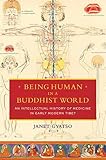Being human in a Buddhist world : an intellectual history of medicine in early modern Tibet / Janet Gyatso.
Material type: TextPublisher: New York : Columbia University Press, 2015Description: 1 online resource (539 pages)Content type:
TextPublisher: New York : Columbia University Press, 2015Description: 1 online resource (539 pages)Content type: - 9780231538329
- 0231538324
- 0231164963
- 9780231164962
- Buddhism -- Tibet Region -- History
- Medicine, Tibetan -- History
- Medicine -- Religious aspects -- Buddhism
- Medicine, Tibetan Traditional -- history
- Buddhism -- history
- Tibet Autonomous Region (China)
- Bouddhisme -- Tibet historique -- Histoire
- Médecine tibétaine -- Histoire
- RELIGION -- Comparative Religion
- RELIGION -- Buddhism -- Theravada
- Buddhism
- Medicine -- Religious aspects -- Buddhism
- Medicine, Tibetan
- Tibet Region
- 294.3/366109515
- BQ7584
- WZ 70 JT5
- online - EBSCO
- 73.61
| Item type | Current library | Call number | URL | Status | Notes | Barcode | |
|---|---|---|---|---|---|---|---|
 eBook
eBook
|
Biblioteca "Angelicum" Pont. Univ. S.Tommaso d'Aquino Nuvola online | online - EBSCO (Browse shelf(Opens below)) | Online access | Not for loan (Accesso limitato) | Accesso per gli utenti autorizzati / Access for authorized users | (ebsco)944986 |
Browsing Biblioteca "Angelicum" Pont. Univ. S.Tommaso d'Aquino shelves, Shelving location: Nuvola online Close shelf browser (Hides shelf browser)
Print version record.
Includes bibliographical references and index.
This volume explores medical thought in Tibet and reveals an otherwise unnoticed intersection of early modern sensibilities and religious values in traditional Tibetan medicine. It looks at how Buddhist concepts and values were adapted to medical concerns and highlights important ways in which Buddhism played a role in the development of Asian and global civilisation. It ultimately finds that Tibetan medical scholars absorbed ethical and epistemological categories from Buddhism yet shied away from ideal systems and absolutes, instead embracing the imperfectability of the human condition.
Part I: In the Capital -- 1. Reading Paintings, Painting the Medical, Medicalizing the State -- 2. Anatomy of an Attitude: Medicine Comes of Age -- Part II: Bones of Contention -- 3. The Word of the Buddha -- 4. The Evidence of the Body: Medical Channels. Tantric Knowing -- 5. Tangled Up in System: The Heart, in the Text and in the Hand -- Coda: Influence, Rhetoric, and Riding Two Horses at Once -- Part III: Roots of the Profession -- 6. Women and Gender -- 7. The Ethics of Being Human: The Doctor's Formation in a Material Realm -- Conclusion: Ways and Means for Medicine.
In English.









